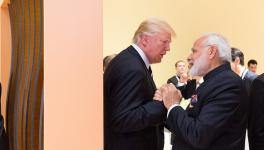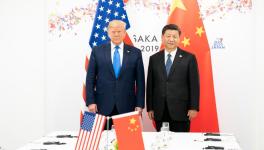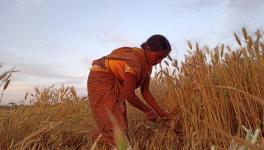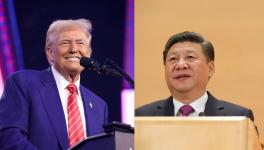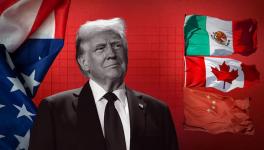TRIPS Waiver Negotiations: Big Pharma & Developed Countries Upbeat, India Silent!
The stark vaccine inequity during the COVID-19 pandemic has failed to appeal to the humanitarian side of the Big Pharma and the developed countries representing its interests.
As the 12th Ministerial Conference of the World trade Organization (WTO) inches closer, the negotiations on the TRIPS (Trade-Related Aspects of Intellectual Property Rights) waiver proposal seem to be moulding towards strengthening the patent regime in favour of Big Pharma.
India and South Africa had mooted the TRIPS waiver proposal in October 2020. The India-South Africa proposal demands a temporary waiver of certain TRIPS (Trade Related Intellectual Property Rights) obligations on copyrights and related rights, industrial designs, patents, and the protection of undisclosed information in relation to the prevention, containment, or treatment of COVID-19.
However, even after nearly two years of formal and informal negotiations, the TRIPS waiver proposal has not seen the light of the day, and in fact, many developed countries, representing the interests of the Big Pharma lobby, are pushing for TRIPS-Plus provisions that negate the flexibilities available to developing and less developed countries to safeguard their own interests against the corporate onslaught.
The WTO Director-General had circulated a draft text on May 3, 2022, which has formed the basis of intense ongoing negotiations at the WTO in the run up to the 12th WTO Ministerial in June 2022. This text has emerged from the informal discussions among the US trade representative (USTR), the European Union (EU), South Africa and India, led by the WTO Secretariat.
Many experts have analysed the text, a latest version of which is being discussed behind closed-door negotiations. The text is not in the public domain as yet but one version appeared and was placed on the website Bilaterals.org as on May 25.
Making Mockery of India-South TRIPS Waiver Proposal
As part of the ongoing negotiations, the developed countries, such as the United Kingdom and Switzerland, have introduced several restrictive conditions in the draft text, making the intellectual patent regime even stronger.
The rationale of the proposed TRIPS waiver agreement is to ensure production and supply, including through exports. However, the text makes a mockery of this objective.
Firstly, the text allows only an "eligible Member" to limit the rights provided for under Article 28.1 of the TRIPS Agreement to use flexibilities under TRIPS and safeguard domestic interests. However, an eligible member is defined as any developing country member that exported less than 10% percent of world exports of COVID-19 vaccine doses in 2021. This basically tries to curb countries such as China, whose share in total exports of COVID-19 vaccines in 2021 is about 34% and which have provided vaccines and drugs to many developing countries during the pandemic.
This is a significant departure from the Doha Declaration on TRIPS and Public Health where flexibilities under Article 28.1 and the use of compulsory licenses (CL) under Article 31 of TRIPS are applicable to all Members.
Experts argue that if this criterion of an “eligible member” is extended to therapeutics, the consequences would be even more devastating as many of the therapeutics producers and exporters are from developing countries such as India.
It must be noted that, generally, developed countries have persistently tried to limit the developing countries from special and differential treatment at the WTO. The WTO negotiations during the pandemic appear to be no exception.
Secondly, the text encourages developing countries with production and export capacities to opt out of using the flexibilities under TRIPS.
According to reports, at a General Council meeting on May10, China had said that if the concern on the criterion of export share to define eligible members is addressed, "we will not seek the use of flexibility provided for" in the draft TRIPS COVID-19 text circulated by the WTO DG.
However, this option emboldens developed countries and Big Pharma to increase pressure on developing countries with capacity to export to stop using compulsory licenses.
A close reading of the text reveals that many of the provisions in this text have been made even more stringent than the TRIPS agreement. Many of these, in fact, are in the nature of TRIPS plus provisions – entailing additional conditions to use the compulsory or government-use license than those prescribed under the WTO's TRIPS regime – which end up providing a higher level of intellectual property (IP) protection to patent holders.
One, for the use of TRIPS flexibilities such as the compulsory license, the draft text imposes the necessity condition, specifying that the “eligible member” can use this only “to the extent necessary to address the COVID-19 pandemic.” This requirement is a TRIPS-plus element as the issuance of a compulsory license has never been subject to such tests under the TRIPS Agreement.
Two, the draft text instructs that “Eligible Members shall undertake all reasonable efforts to prevent the re-exportation of the COVID-19 vaccine that has been imported into their territories”. Experts opine that this is a TRIPS-Plus condition and should not be imposed in a public health emergency such as COVID-19. During the COVID-19 pandemic, many developing countries shared vaccines with other developing and less developed countries in a show of solidarity and dose-sharing commitment.
Three, the draft text specifies that the ‘patented subject matter' only includes ingredients and processes necessary for the manufacture of the COVID-19 vaccine. This limits the use of CL only for patented vaccines, ingredients and processes. This conditionality comes under the TRIPS-Plus element as under Article 31 of TRIPS, compulsory licenses can be issued for any subject-matter.
Four, the text fails to address the barriers due to trade secrets. The manufacturing know-how is often protected as a trade secret (under Article 39 of TRIPS), access to which can accelerate the manufacture and regulatory approval of vaccines. However, a recent modification suggested by developed countries in the draft text specifies that “[N]othing in this paragraph shall be interpreted as allowing the disclosure of undisclosed information submitted by the originator to the respective authorities of an eligible Member in a marketing approval procedure”.
This addition is TRIPS-Plus as it nullifies the flexibilities that WTO Members have under the Article 39.3 of the TRIPS Agreement.
Voices Challenging India Govt’s Silence and Opacity
Numerous voices across the globe—civil society, academics, researchers and experts—have spoken against the draft text on the waiver proposal being currently negotiated. Renowned experts including Professors Joseph Stiglitz, Jayati Ghosh and Srinath Reddy sent direct appeals to Indian and South African heads of state.
Civil Society and other subject experts recently sent a letter (dated May 28) and appealed to Prime Minister Narendra Modi “to direct the commerce ministry to proactively engage in the TRIPS Waiver negotiations and provide leadership to the coalition of 65 WTO Members co-sponsoring the proposal”.
While congratulating the PM on his statement at the 2nd Global COVID Summit, the letter points out that “The actions of the Commerce Ministry regarding the TRIPS Waiver proposal since the second part of 2021 are opaque and chillingly silent. Throughout the Quad process as well as after the tabling of the text there is no statement or explanation clarifying India’s position on the TRIPS Waiver”.
The experts have urged that the final text should ensure the inclusion of therapeutics and diagnostics and not be limited to vaccines, and that the TRIPS Plus provisions such as, disclosure of information only in the case of a compulsory license, notification requirements and anti-diversion clauses must be done away with.
Member of Parliament (Lok Sabha) from Thrissur, T.N. Prathapan has been consistently writing to the PM Modi to reject the leaked compromise text of the TRIPS waiver. He has suggested the possible extension of the TRIPS waiver to therapeutics and diagnostics and remove all TRIPS plus conditions from the final text.
Citing “a slowing down of India’s approach and proactive role in the TRIPS waiver since the change of Bureaucratic Head at the commerce ministry”, he appealed to him again “to take stock of the situation and provide clear instructions to the commerce ministry to provide proactive leadership for the TRIPS waiver text based negotiations”.
As demands by activists and experts from across the globe to reject the draft text and to negotiate strongly on behalf of the poorer countries increase, India has gone into an eerie silence over the issue. Although WTO’s 12th Ministerial Conference begins this week, but the fate of the TRIPS waiver proposal still remains uncertain.
However, the way the negotiations are going, it appears that the Big Pharma may succeed and the world might end up with a more stringent intellectual property rights regime in place. This would take us backwards with gains made through TRIPS flexibilities being undone by TRIPS-Plus provisions.
Get the latest reports & analysis with people's perspective on Protests, movements & deep analytical videos, discussions of the current affairs in your Telegram app. Subscribe to NewsClick's Telegram channel & get Real-Time updates on stories, as they get published on our website.











